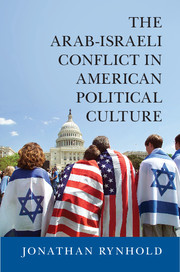Book contents
- Frontmatter
- Dedication
- Contents
- Acknowledgments
- Introduction
- 1 Like U.S.: American Identification with Israel
- Part I Party and Ideology
- Part II Protestants
- Part III Jews
- 6 American Jewish Attachment to Israel: Mind the Gap
- 7 American Jews and the Peace Process: Divided We Stand?
- Conclusion
- Notes
- Bibliography
- Index
Conclusion
Published online by Cambridge University Press: 05 February 2015
- Frontmatter
- Dedication
- Contents
- Acknowledgments
- Introduction
- 1 Like U.S.: American Identification with Israel
- Part I Party and Ideology
- Part II Protestants
- Part III Jews
- 6 American Jewish Attachment to Israel: Mind the Gap
- 7 American Jews and the Peace Process: Divided We Stand?
- Conclusion
- Notes
- Bibliography
- Index
Summary
America’s strong bonds with Israel are well known. This bond is unbreakable … But if we see this conflict only from one side or the other, then we will be blind to the truth: The only resolution is for the aspirations of both sides to be met through two states … Hamas must put an end to violence, recognize past agreements, recognize Israel’s right to exist. At the same time … the United States does not accept the legitimacy of continued Israeli settlements. It is time for these settlements to stop.
—President Barack Obama, Cairo University, June 4, 2009In pursuit of a peace process, the United States today has exerted substantial pressure on Israel while putting almost no pressure on the Palestinians and the Arab world. We can encourage both parties in the conflict, but we must never forget which one is our ally.
—Mitt Romney, AIPAC, October 2009Americans’ identification with Israel is deeply rooted in American political culture. Since the turn of the millennium, sympathy for Israel has grown to new heights. At the same time the debate over how to handle the Arab-Israeli conflict has become increasingly divisive, and these divisions increasingly line up with the major political, ideological, and religious divides in America. This is the “Israel paradox” in American political culture. The paradoxical growth of both support for Israel and controversy surrounding its policies actually share some common foundations. The consequences of widespread identification with Israel are not confined to support for the Jewish state. Rather, identification with Israel means that what Israel does and what is done to Israel carries with it an unusually high degree of symbolic meaning for Americans. Consequently, more is symbolically at stake in the Arab-Israeli conflict than in other conflicts around the world.
- Type
- Chapter
- Information
- The Arab-Israeli Conflict in American Political Culture , pp. 181 - 188Publisher: Cambridge University PressPrint publication year: 2015



